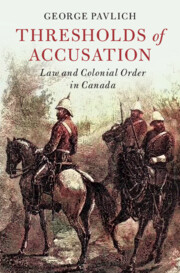Book contents
- Thresholds of Accusation
- Cambridge Historical Studies in American Law and Society
- Thresholds of Accusation
- Copyright page
- Dedication
- Contents
- Figures
- Preface
- Acknowledgements
- 1 Grammars of Critique and Colonial Accusation
- 2 Reconnaissance Discourses for Colonial Law
- 3 Sovereign Spectacles and Criminal Accusation
- 4 Justices of the Peace at Accusatory Theatres
- 5 Training Police Accusers
- 6 Moulding Accused Individuals
- 7 Biopolitics and Colonial Accusation
- 8 Denouements and Turned Spades
- References
- Index
5 - Training Police Accusers
Published online by Cambridge University Press: 14 September 2023
- Thresholds of Accusation
- Cambridge Historical Studies in American Law and Society
- Thresholds of Accusation
- Copyright page
- Dedication
- Contents
- Figures
- Preface
- Acknowledgements
- 1 Grammars of Critique and Colonial Accusation
- 2 Reconnaissance Discourses for Colonial Law
- 3 Sovereign Spectacles and Criminal Accusation
- 4 Justices of the Peace at Accusatory Theatres
- 5 Training Police Accusers
- 6 Moulding Accused Individuals
- 7 Biopolitics and Colonial Accusation
- 8 Denouements and Turned Spades
- References
- Index
Summary
Frequently serving as accusers, or as facilitators for other accusers, Northwest Mounted Police officers were coached on how and when to delimit social disorder. The fifth Chapter highlights examples of their training to perform as accusers (or to facilitate other accusers) around theatres that categorized criminal acts and actors. Here officers were instructed in both ‘direct’ and ‘indirect’ governance (as per Bentham), with lessons derived from paramilitary and police science disciplines. Recruits learned how to follow commands to deploy violence, and how to use discretion in efforts to prevent dissent. With inspiration from the Royal Irish Constabulary, police officers also learned how to become criminal accusers by habit. That training, with its colonial biases clear, is detectable from a paradigmatic example of police responses to the first death of a Northwest Mounted constable in 1882. Located within a settler assumptive universe supporting dispossessing visions of social order, one glimpses how police training in this case focused accusations on Indigenous persons.
Keywords
- Type
- Chapter
- Information
- Thresholds of AccusationLaw and Colonial Order in Canada, pp. 115 - 142Publisher: Cambridge University PressPrint publication year: 2023



